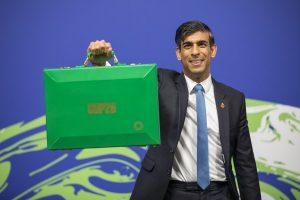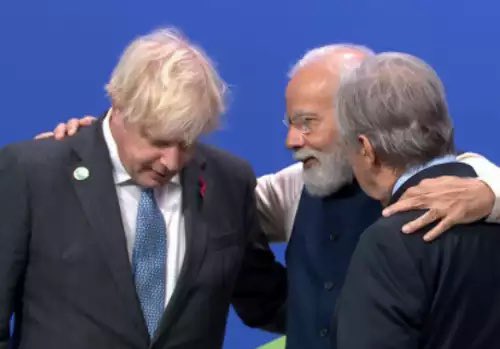London: COP26 or UNFCCC dominated the news, conversation, and TV soap operas this week— the ambitious agenda has been vindicated. The end of coal is on the horizon as developed nations have pledged new support to help developing countries make the transition to clean energy. The end of deforestation is around the corner, an alliance of governments, companies, the agri-commodity sector, financial actors, and non-state leaders from 100 countries have pledged to halt and reverse forest loss and land degradation by 2030. Billions of dollars have been mobilised to mainstream nature into policies, analysis, assessments, advice, investments, and operations, in line with respective mandates and operating models.
Global Britain held its own stage led by Boris Johnson’s artistry with words, powers of persuasion, and Zac Goldsmith’s passion for ecology and the environment. Notable was Johnson’s exceptionally complimentary introduction to India’s Prime Minister, “the one and only Narendra Modi”, and the one and only leader who appeared in person from the three Asia Pacific giants. PM Modi promised net-zero emissions by 2070, a realistic not fantasy target, backed by the installation of 500 gigawatts of non-fossil fuel and renewable energy by 2030, a giant leap in reducing India’s carbon emissions.
The two Prime Ministers raised the bar with the “Green Grids Initiative – One Sun One World One Grid” (GGI-OSOWOG), which will accelerate the development and deployment of interconnected electricity grids across continents, countries, and communities, to create universal energy access to the poorest through mini-grids and off-grid solutions.

Over 40 world leaders, including, India, US, EU, China, signed up to the new Breakthrough Agenda which is modelled on the UK’s landmark Net Zero Strategy, to speed up the development and deployment of clean technologies and make them more affordable by 2030. Boris Johnson set out the first five goals to make 1.5C global emissions a reality:
• Make clean power affordable and reliable by 2030
• Make zero-emission vehicles the new affordable normal by 2030.
• Near-zero emission steel production established and growing in every region by 2030.
• Make affordable, renewable, and low carbon hydrogen globally available by 2030.
• Make climate-resilient, sustainable agriculture the most attractive and widely adopted option for farmers everywhere by 2030.
Delivering these breakthroughs could create 20 million new jobs globally and add over $16 trillion across both emerging and advanced economies.

Chancellor Rishi Sunak said the UK will be the world’s first Net Zero-aligned Financial Centre, under new Treasury rules, UK financial institutions and listed businesses must set net-zero transition plans that will be published from 2023. There will be strong Government oversight of the financial sector as a whole to ensure financial flows shift towards supporting net-zero.
Meanwhile, below all these Coptimistic agreements UK’s 6th largest renewable energy supplier BULB may have to be supported by the Treasury and UK taxpayers if new financial backers cannot be found because of the crisis of wholesale energy price rises.
Concurrent with COP26 the House of Commons passed the second reading of the Nuclear Energy Financing Bill 2021-2022, this is expected to allow new nuclear projects to be financed via private investors such as pension funds and insurers and reduce reliance on overseas investors. It would be funded by a charge on electricity suppliers, who are expected to pass the cost on to consumers. The UK has 13 nuclear reactors at six plants which can supply about 20% of UK electricity demand. The majority of these reactors are due to reach the end of their operating lives and be shut down before 2030.
Pre-Glasgow The Inter-Parliamentary Alliance on China (IPAC) legislators met in person for the first time in Rome to send a message to the G20 about the PRC’s human rights abuses, coercive diplomacy, bullying Taiwan, prevent extradition and deportation to China, securing reliable supply chains and supporting common democratic values. India joined IPAC as the 21st legislature represented. The founding members are MPs Sujeet Kumar, Amar Patnaik, and MLA’s Ninong Ering and Ajay Dutt, they released a joint statement saying “The government of the People’s Republic of China poses an unprecedented challenge to human rights and the international rules-based order. In India, we know from first-hand experience the PRC government’s increasingly belligerent approach to its neighbours in the Indo-Pacific. The PRC’s use of military threats and intimidation are greatly destabilising and a grave threat to peace in the region. We have also seen the impact of the PRC government’s brutal oppression. India is proud to have provided a home to tens of thousands of Tibetans fleeing persecution. As the world’s largest democracy, India must be at the forefront of efforts to defend our common democratic values. These challenges are bigger than any one country or political party, and so we are glad to join with IPAC parliamentarians from across the world in a united effort towards democracy, peace, and prosperity in Asia and beyond.”
Inopportunely alleged Tory sleaze reared its ugly head interrupting the COP conference, and giving the opposition their favourite battle cry “one rule for MP’s and one rule for us” and drowning out the successes of Glasgow. The issue in question was alleged paid advocacy, the MP in question was destined for a 30-day suspension for the contravention of parliamentary rules; however, Tory MPs were whipped into voting for an amendment to reform the Standards Committee process that would have protected the MP from the allegations and avoided the suspension. The hoo-ha resulting from the narrow passing of the vote on Wednesday forced the government on Thursday to U-turn and accept the suspension, the MP has subsequently resigned, prompting an impromptu by-election. The MP and the Conservative MPs who voted for the protective amendment and the government, all have egg on their faces for the chaotic way this unfolded, including the way a ministerial aide/MP was sacked for abstaining and reinstated several hours later.
A by-election has also been called in Old Bexley and Sidcup following the death of one of the UK’s most popular and decent MP’s. The Tory’s have selected local boy Louie French who goes up against Richard Tice, leader of Reform UK-formerly the Brexit Party, who is a formidable right-wing opponent, to the extent that the Conservative campaign is being managed centrally not by the local association, the constituency has been privileged to have several ministerial visits.
UK chancellor Rishi Sunak has launched two specials for Diwali, a £5 uncirculated collectors coin to celebrate the life of Mahatma Gandhi, commemorating 75 years of Indian Independence and featuring India’s national flower the lotus— the coin carries Gandhi’s famous quote ‘My life is my message’. The Royal Mint has also produced a limited edition of 20g Gold Bullion Bars with a Goddess Lakshmi design; costing £1,080 and presented in a henna patterned sleeve the bar was designed in collaboration with Nilesh Kabaria from the Sree Swaminarayan Temple in Cardiff.

